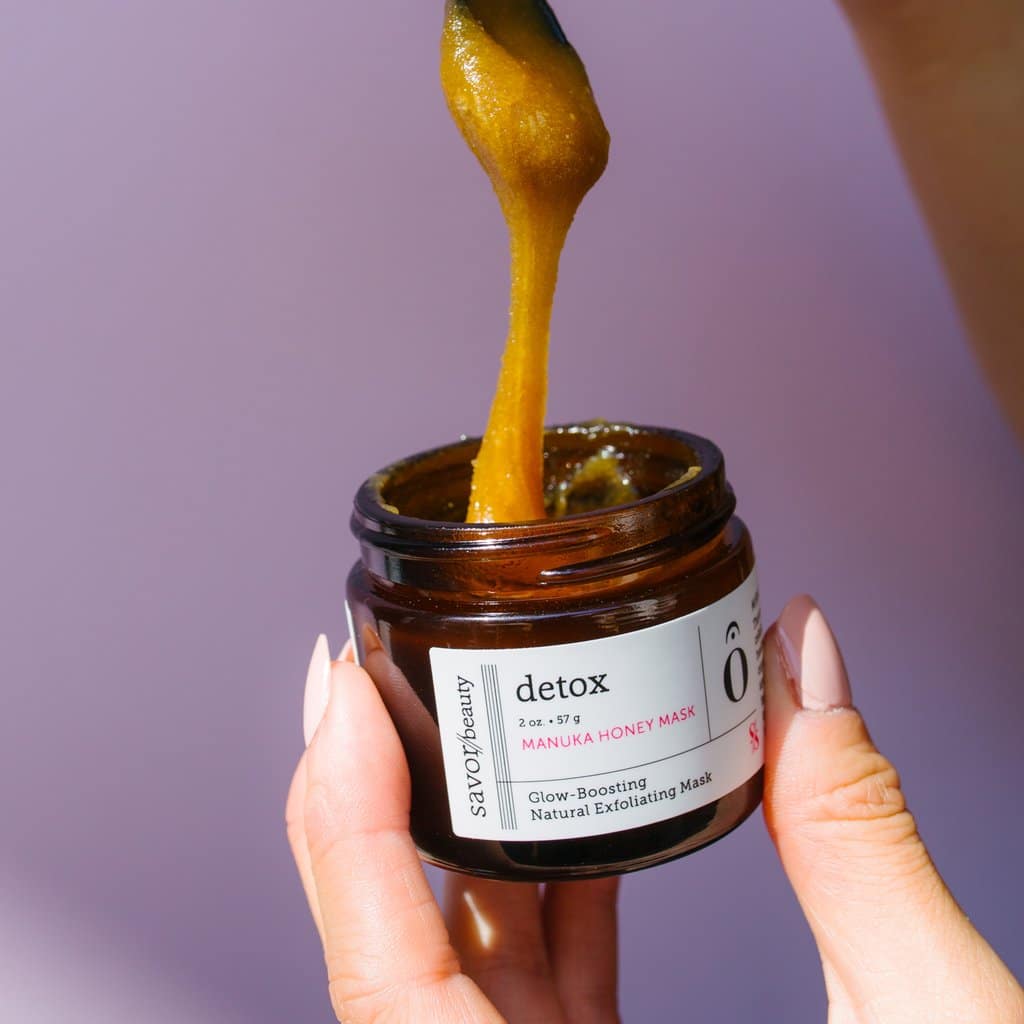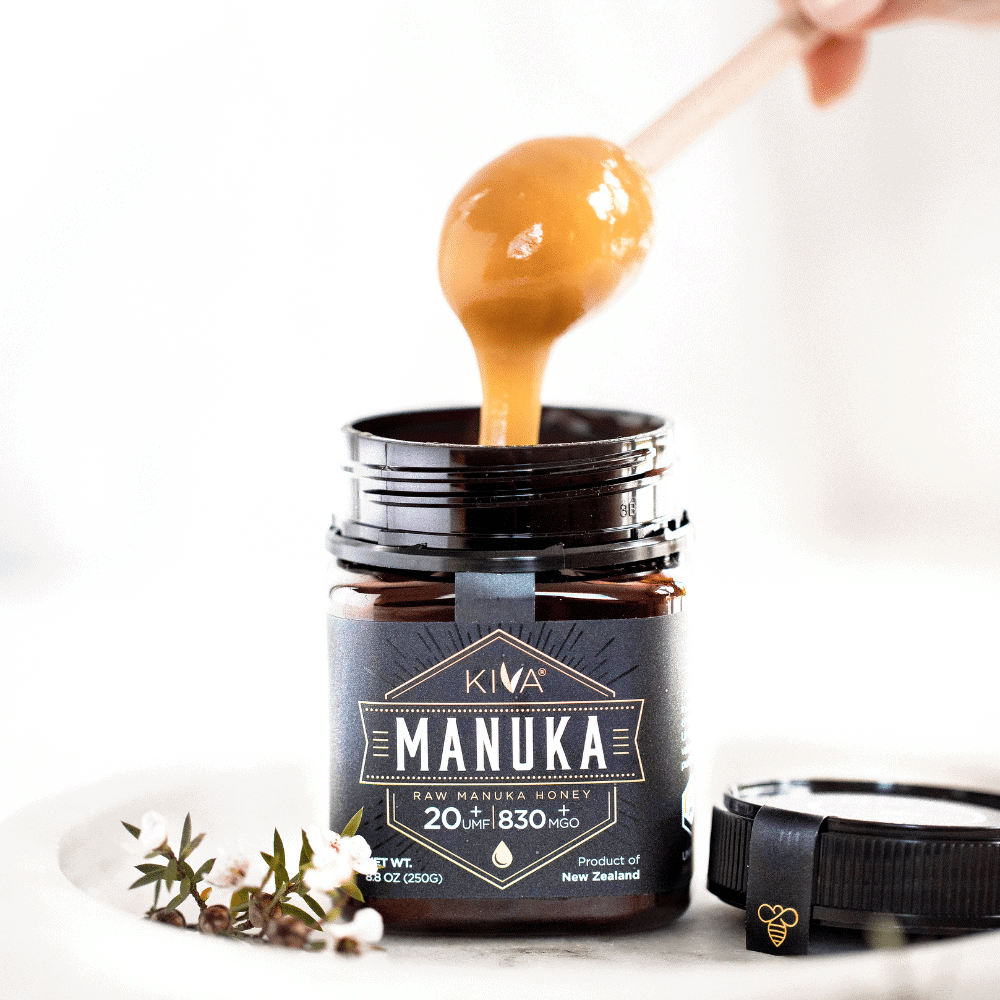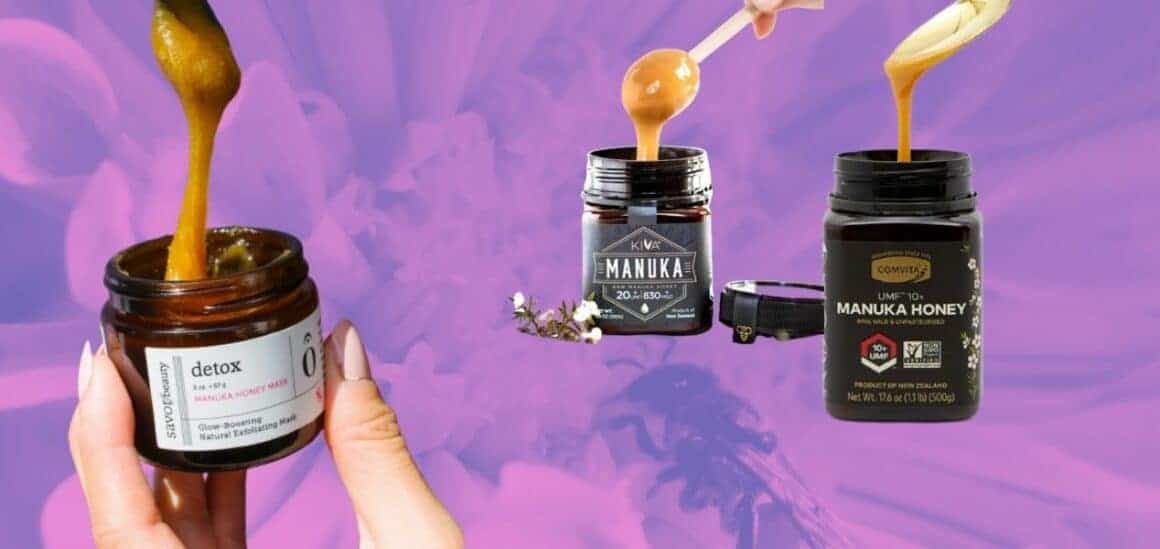What Is Manuka Honey Good For? Manuka honey is a specific type of honey that is endemic in the island country of New Zealand, where it’s produced by bees pollinating tea tree flowers or the Manuka bush. But is it any different from your classic type of honey?
Honey, in general, has powerful antibacterial/antimicrobial properties and is a popular remedy for a host of conditions and infirmities. On the other hand, Manuka honey has some unique organic compounds called methylglyoxal and dihydroxyacetone, which make its antibacterial properties much more potent. Its quality is significantly higher than the different types of honey out there.
8 Benefits of Manuka Honey
Scientific research proves the following benefits of Manuka honey…

1. Clears Away Infections
All types of honey have always been used as a natural antibiotic for centuries among many cultures. Recent research reveals that it’s due to the presence of hydrogen peroxide produced by an enzyme called glucose oxidase, which is added to the plant nectar by the bees.
Since Manuka honey contains methylglyoxal (MG) and dihydroxyacetone (DHA), it has a much stronger effect, eliminating viral infections such as colds, flu, chickenpox, and shingles. The higher the MG and DHA content it has, the more effective and powerful its properties become.
2. Heals Wounds Faster
One of the ages-old usages of honey is to apply it on wounds, sores, boils, burns, and scars. Since honey has high acidity levels, it helps speed up the healing process for wounds and ulcers. Research shows that low moisture levels also collect fluid from the wound to remove and kill bacteria and save it from possible infections.
Another study discovered that the honey’s acidity levels also help facilitate pain relief, amplify tissue regeneration, and reduce wound size for those suffering from burns and scars.
On the other hand, applying honey on recently burst boils gives it a layer of protection from bacteria as the skin starts to dry up.
3. Relieves Sore Throats
Consuming honey is often our go-to quick-fix remedy when we have a nasty case of a sore throat. The antiviral and antibacterial properties can reduce inflammation and kill the bacteria that cause irritation and pain. It also relieves pain by coating the throat’s inner lining, moisturizing it, and giving a calming effect.
But Manuka honey takes it up a notch. A 2012 study discovered that the consumption of Manuka honey significantly decreases the presence of the streptococcus mutans bacteria, which can cause sore throats and other oral health problems.
Coughs are also traditionally treated with honey. Research made by students from Penn State College of Medicine found honey safer and more effective in relieving coughs than common over-the-counter cough medicines.
4. Promotes Good Oral Health
The idea might be alien to some, but honey is also considered a powerful antidote against many oral health problems. Manuka honey, in particular, kills harmful oral bacteria, which causes plaque formations, gum inflammation, and tooth decay without destroying the good bacteria maintaining the healthy balance inside the mouth.
A 2010 Indian study says that ingesting Makuna honey keeps the teeth healthy by breaking down plaque formations around them. People usually add a small amount of it with toothpaste when they brush their teeth as it helps the honey go deeper into the crannies and destroy the plaque from there.
According to research published in the Saudi Dental Journal, Manuka honey’s inflammatory properties are also effective in relieving gingivitis (gum inflammation). The afflicted patient can do this method by gently massaging the affected parts of the gums with a considerable amount of honey for it to seep through the gums.
5. Cures Acne Problems
Acne occurs due to the pores of your skin becoming clogged by sebum, dead skin cells, and other bacteria, and it can be pretty tricky to get rid of. However, instead of recoursing to expensive beauty products and treatments, others opt for a more natural approach to curing facial acne problemsâapplying honey as a facial wash.
As we have mentioned, honey contains anti-inflammatory properties that help heal and soothe acne-affected skin as it does with wounds and scars. Manuka honey’s anti-microbial qualities help eliminate bacteria and dark spots from the skin, making it softer, smoother, and significantly calmer.
The nutrients and enzymes found in honey help the skin retain enough moisture without becoming oily to tighten the skin and help reduce the appearance of wrinkles.
Aside from beautifying the skin, one study published in the Central Asian Journal of Global Health recognizes honey as a potent therapeutic agent in treating other skin conditions like eczema and psoriasis.
Many other studies also highlight the benefits of applying honey to one’s hair. It has also been found to be effective in preventing hair loss, retaining hair moisture, and restoring its natural shine and strength.

6. Improves Digestive issues
Honey is an absolute must-have in your kitchen stash if you’re all for maintaining good gut health. It has always been used as a remedy for many digestive problems such as acid reflux, indigestion, low stomach acid levels, and gastritis. But considering Manuka honey’s anti-inflammatory and antiseptic properties and its unique compounds helps reduce the pain of these stomach problems a lot faster than regular honey does and decreases the risk of any future gut issues.
That said, studies have discovered the power of manuka honey against Clostridium difficile (C.diff) strains, which is a type of bacterial infection responsible for causing stomach troubles like severe diarrhea and bowel inflammation. One particular study found the manuka honey just as effective, if not more, as antibiotics that are commonly used to treat C. diff strains.
Manuka honey also serves as a prebiotic. A group of food researchers found that manuka honey is a good source of oligosaccharides. This non-digestible carbohydrate helps promote the growth of “good” bacteria like lactobacilli and bifidobacteria in the digestive system, which work with the probiotics in attacking pathogens.
Check out our list of the best prebiotic and probiotic combinations.
7. Boosts Energy Levels
Nothing beats the sweetness of honey, as it naturally has both glucose and fructose, and these two things help your body get up on its feet. Glucose provides the body with a speedy energy boost. At the same time, fructose has a slower, more sustained effect on blood sugar levels for the body to maintain energy levels for a long time without it crashing drastically.
The rush of “energy” given by foods rich in refined sugars and carbohydrates is nothing more than a sugar rush without the nutrients necessary to maintain blood sugar levels healthily.
On the contrary, high-quality honey like Manuka honey contains nutrients and antioxidants responsible for helping the body absorb and utilize sugar and support the body for pre-workout, intense physical activities, and heavy endurance sports.
With its energy-giving properties considered, it’s not surprising that honey is ideal for athletes seeking to boost their performance. In 2008, the US National Honey Board conducted three clinical trials that yielded positive results, recommending honey for its effective energy production and low glycemic index.
8. Enhances The Immune System
Given all of its benefits, honey may as well be considered a superfood. Apart from combating bacteria and infections inside the body, its antioxidants, antibacterial properties, enzymes, and nutrients also improve and boost the immune system. But what’s the science behind it?
While other kinds of honey also help the immune system, we know that MG and DHA compounds are present in Manuka honey; all of its properties are likely to be more effective and potent in destroying disease-causing bacteria and infections and facilitating faster recovery from injuries and illnesses. It’s safe then to assume that it will ensure the immune system with higher protection.
Studies also show that Manuka honey can increase the number of cytokines released in the body. Cytokines are small proteins that are important in immune response and in controlling the growth of other immune system cells and are responsible for helping white blood cells detect and eliminate invaders.
In light of the global COVID-19 pandemic, some scientists are currently looking into the potential of honey’s antibacterial and antiviral properties in boosting patients’ immune systems affected by the coronavirus. One research points out the inhibitory effects of Manuka honey which could combat the influenza virus, but these need further exploration.
Is It Safe For All?
Using or consuming Manuka is generally safe for most people, as with other kinds of honey. But the following might want to think about it before buying:
- People with diabetes – Honey is considered a healthier option than sugar, but take note that all kinds of honey still have a high [natural] sugar content, making it sweeter than sugar, so consuming Manuka honey may still affect a diabetic person’s blood sugar levels.
- People with honey or bee allergies – Naturally, people who are allergic to honey or bees and those with seasonal allergies are most likely to have an adverse reaction after consuming or applying Manuka honey. The presence of the pollen in raw or unprocessed honey might cause some itching, hives, or even inflammation in the mouth or the throat.
- Babies – Parents should not give honey to any child below the age of 1 at all costs, as this might put the child at risk of infant botulism, a rare but severe gastrointestinal condition caused by Clostridium botulinum bacteria, which can sometimes contaminate honey. Its spores can affect and thrive the child’s intestines and produce toxins. Complications might even lead to death.
Regardless of your condition, it pays to be prudent in making these health decisions. Consult a medical professional first regarding the consumption of honey to discuss possible risks.
How Should I Use Manuka Honey?
There are many ways to enjoy the many benefits of Manuka honey.
Ingestion
Try to consume at least 1 to 2 tablespoons of Manuka honey daily. You can eat it straight, dilute it in water, or add it to your favorite dishes or drinks like tea or lemonade. Being a natural sweetener, you can use it as a substitute for sugar and even use less of it since it’s also much sweeter.
Topical Application
When using the honey for wounds, face, skin, teeth, or gums, Make sure to clean your hands or utensils before applying them to your body to prevent possible contamination. The honey can also be used either purely or gently diluted before applying, without using excessive amounts.Â








